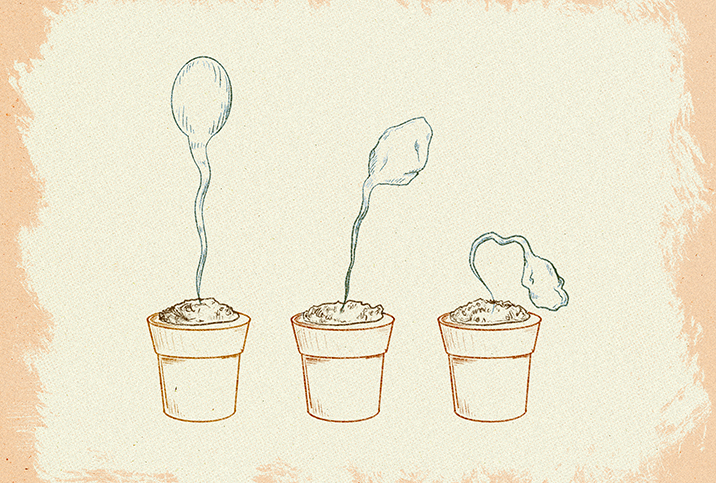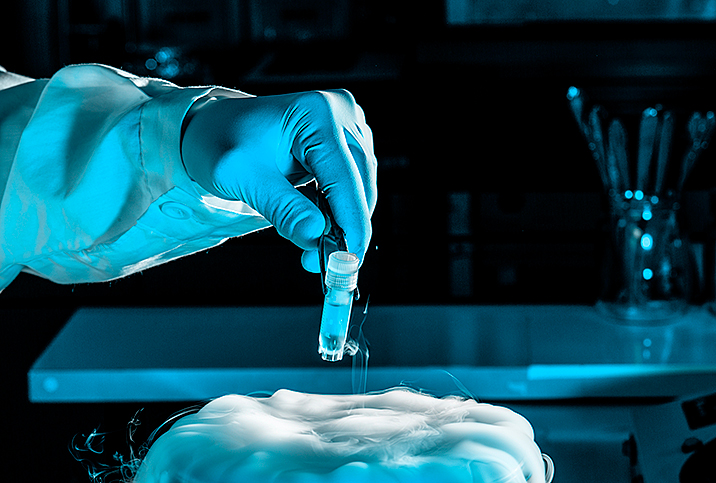Please Stop Believing These Male Infertility Inaccuracies

Getting pregnant may be subject to more misinformation than any other topic. Myths, legends and old wives' tales abound on how to put a bun in the oven.
You can improve fertility by eating all manner of animal penises and testicles, according to lore from many cultures. You can sit in the "miracle chair" at Naples, Italy, or visit the statue of 19th-century French journalist Victor Noir to rub his crotch to raise your pregnancy chances.
The dubious fertility advice you and your partner get may not be as theatrical, but if you're trying to have a baby, you're bound to hear from well-meaning but misinformed friends, family members and pop-science websites.
Allow us to rain on a few modern myths about fertility.
Inaccuracy #1
Infertility is usually the woman's problem
After one year of unprotected sex, 15 percent of couples are unable to conceive, according to the National Institute of Child Health and Human Development (NICHD). After two years of trying, about 10 percent still can't conceive.
One pernicious myth, which seems to persist, is that when a couple has trouble conceiving, it's more often an issue on the female side of the equation than the male side. That's simply not true.
The NICHD reports the underlying causes of infertility cases are evenly divided: A third of the time it's an issue with the man, a third of the time an issue with the woman, and another third of the time an issue with both of them or the cause is unknown. So if she's going to get checked after a year of trying to have a baby, he should be evaluated, too.
"Whenever somebody's going through the fertility workup—and oftentimes it will be driven by the female in the relationship—both people should get worked up," said Amy Pearlman, M.D., the director of men's health at the Carver College of Medicine at University of Iowa Health Care. "Because even if they find a female component, there could also be a male component."
Inaccuracy #2
More testosterone is always better
The way testosterone works for fertility can be a source of confusion for guys.
At the most basic level, most people probably remember testosterone is the "male hormone," though that is a bit of a misnomer—it is really a sex hormone. Testosterone is responsible for hair growth, deeper voices and muscle mass during puberty, as well as sex drive and sperm production.
A big mistake guys make is thinking more testosterone means more sperm.
With an avalanche of ads for low-T clinics everywhere you turn, it's perhaps understandable men might be confused on this one. If you're trying to have a baby, taking testosterone replacement therapy (TRT) might be the last thing you want to do.
"The greatest misconception I see is that patients or their providers feel that giving the man testosterone will boost his semen and/or sperm production," said William Brant, M.D., chief of urology at the Salt Lake City Veterans Affairs Medical Center. "It is the opposite. Most men who take testosterone will decrease or eliminate their fertility."
Yep, taking testosterone supplements—or exogenous testosterone, coming from outside the body—can temporarily or even permanently shut down your body's ability to produce sperm.
"Men's health clinics promote, 'Oh, you want to feel better. Do you feel tired, do you want better sexual health?'" Pearlman said. "So they get a lot of these young guys in their 30s and 40s [on TRT], but they don't always ask them if they want to preserve future fertility or if they're actively trying to conceive. Putting someone on exogenous testosterone can make them infertile. I've seen guys who've been on therapy and don't know that."
Inaccuracy #3
I don't have to worry about a biological clock
While it is a well-known fact women's fertility begins to decline in their 30s, men's fertility is also affected by age. In fact, couples trying to conceive when the male partner is 40 years of age or older should be advised of the increased risk of adverse outcomes for their child, according to American Urological Association guidelines.
Those potential outcomes for the child are definitely worth noting: an increased risk of schizophrenia, autism, and a bone and cartilage disorder called chondrodysplasia.
"Nobody thinks about men having a clock," Pearlman said. "They think if they can have an erection and ejaculate, that's it. Nobody really talks about, is it really a good idea for a 55-year-old male to have a child? And while it can be possible, there can be changes in the sperm in the 55-year-old man.
"I'm not too sure how often that gets brought up, to be honest with you," Pearlman added, noting she sees a number of guys in that age group who want a vasectomy reversal, often because they're with a new partner and want to have a baby.
Inaccuracy #4
Fertility is a wholly physical issue
Men's fertility can be as complicated and difficult to navigate as female fertility.
One solid piece of advice most healthcare providers give couples is to remember neither partner is alone in the process. Trying to be supportive of each other and compassionate about your partner's feelings—and your own—is crucial when trying to navigate these treacherous waters.
"When it comes to infertility, it's a very sensitive thing because there's lots of blame that gets thrown around," Pearlman said. "In reality, most of the time, it's both people."
Certainly, accusations and guilt have no place in what is demonstrably a medical issue. Approaching the problem rationally—and as a team—can be the key to working through fertility issues toward a healthy, positive outcome.


















